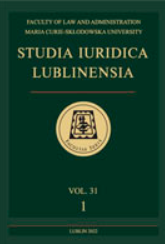Administrative Law in the Time of a Permanently Transforming Regulatory Environment
Administrative Law in the Time of a Permanently Transforming Regulatory Environment
Author(s): István Hoffman, István Miklós BalázsSubject(s): Governance, Public Administration, Government/Political systems, Health and medicine and law, Administrative Law
Published by: Wydawnictwo Naukowe Uniwersytetu Marii Curie-Sklodowskiej
Keywords: administrative law; self-governance; administrative licenses and permission; COVID-19 pandemic; epidemic; state of danger; Hungary;
Summary/Abstract: The Hungarian administrative law has been significantly impacted by the COVID-19 pandemic. Several rules – which were introduced during the state of danger based on the epidemic situation – have been incorporated into the Hungarian legal system. The administrative procedural law has been influenced by the epidemic transformation. However, the rules on e-administration have not been reformed significantly (due to the digitalisation reforms of the last years), but the rules on administrative licenses and permissions have been amended. The priority of the general Code on Administrative Procedure has been weakened: a new, simplified procedure and regime have been introduced. The results of these reforms became obvious in 2021: the number of administrative cases has been decreased. Even the decision-making of the central government bodies has been transformed partially, a trend of “militarisation” can be observed, as well. The local self-governance has been impacted by the reforms. The transformation has had two opposite trends. On the one hand, the Hungarian administrative system became more centralised during the last year: municipal revenues and task performance have been partly centralised. The Hungarian municipal system has been concentrated, as well. On the other hand, the municipalities could be interpreted as a “trash can” of the Hungarian public administration: they received new, mainly unpopular competences on the restrictions related to the pandemic. This approach transformed in the last months, and even several unpopular decisions were recentralised. Although, these changes have been related to the current epidemic situation, but it seems, that the “legislative background” of the pandemic offered an opportunity to the central government to pass significant and reforms.
Journal: Studia Iuridica Lublinensia
- Issue Year: 31/2022
- Issue No: 1
- Page Range: 43-62
- Page Count: 20
- Language: English

